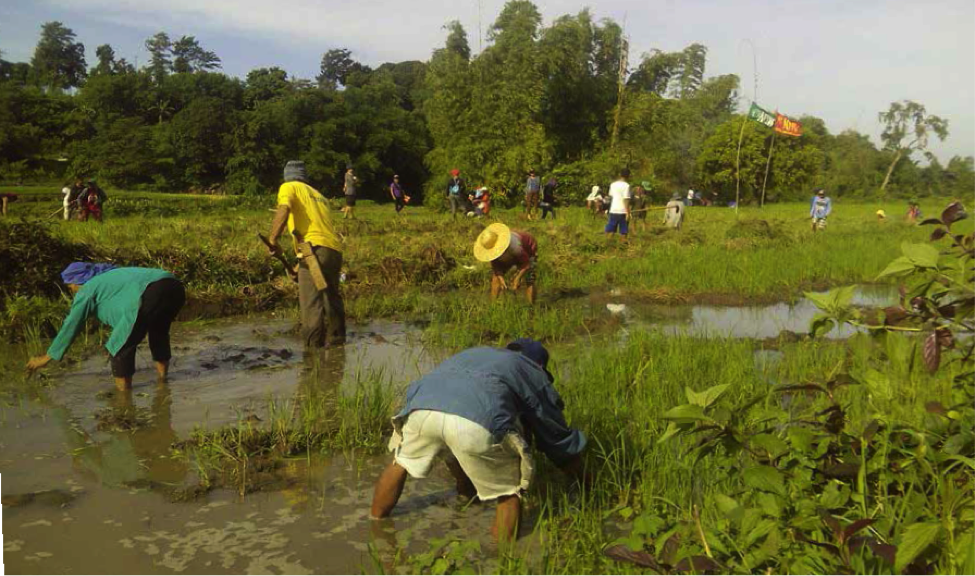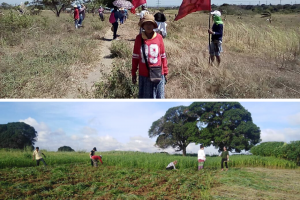In photo: Collective land cultivation in Negros Occidental, Philippines. Photo by NFSW in Tariman-Acosta, 2017
The 5th UN Environment Assembly will be convened early in 2021 with the theme “Strengthening Actions for Nature to Achieve the Sustainable Development Goals (SDGs)”. The President of the UNEA-5, Sveinung Rotevatn, called for inputs into the assembly’s ministerial declaration by asking two questions: (1) What would you welcome as the most important elements and/or key messages from the ministers in the declaration to address the theme in an impactful manner?; and (2) How can the environment assembly make a significant contribution to Strengthening Actions for Nature to Achieve the SDGs at a global scale? In doing so, you may take into account the preparation for the meeting, its conduct and follow-up as well as its relationship to other meetings and processes.
Below is IBON International’s response to the call for inputs to the UNEA-5 ministerial declaration.
The theme of the Fifth Session of the UN Environment Assembly (UNEA-5) “Strengthening Actions for Nature to Achieve the Sustainable Development Goals (SDGs)” conveys the urgency of addressing the ongoing environmental destruction, biodiversity loss, and climate change. Indeed, genuine sustainable development cannot happen on a dead planet.
The year 2020 marks the end of the UN Decade on Biodiversity and yet, the rate of biodiversity loss is much worse. The Intergovernmental Science-Policy Platform on Biodiversity and Ecosystem Services (IPBES) Global Assessment Report on Biodiversity and Ecosystem Services in 2019 warned that around one million species are at risk of extinction. This is ironic but unsurprising since neoliberal globalization which facilitated the huge changes in land and sea use, direct exploitation of organisms, climate change, pollution, and invasive alien species that the IPBES report identified as the major causes of biodiversity loss remains intact and in full-swing. The expansion of monocrop, chemical-based agriculture, investments in giant extractives and dirty energy projects, and off-shoring of pollutive and hazardous production processes enabled by liberalization and deregulation policies through the International Monetary Fund-World Bank (IMF-WB) and various trade and investment agreements, continue to fuel the engine that drives biodiversity loss to the point of mass extinction.
The expansion of monocrop, chemical-based agriculture, investments in giant extractives and dirty energy projects, and off-shoring of pollutive and hazardous production processes enabled by liberalization and deregulation policies through the IMF-WB and various trade and investment agreements, continue to fuel the engine that drives biodiversity loss to the point of mass extinction.
The novel Coronavirus disease (COVID-19) pandemic has further exposed the systemic weaknesses of the current neoliberal system of global consumption and production and unleashed its worst impacts on the working people and marginalized sectors. Aside from helping the spread of the virus from animals to humans through destructive production and consumption processes that disturb wildlife habitats, and through the greater transport connectivity between countries that facilitate the movement of goods, people, as well as diseases, neoliberal globalization has also made entire populations vulnerable to crises such as this pandemic through privatization of healthcare and social services, devastation of sustainable local food systems, dispossession communities of access to resources, and eviction of indigenous peoples from their ancestral lands.
Thus, calls and measures for strengthened action to protect and restore nature, and the nature-based solutions to achieve the sustainable development should put people’s rights at their core and should support the dismantling neoliberal globalization which thrives on unsustainable production and consumption and have caused massive environmental destruction, biodiversity loss, global warming, poverty, and human rights violations.
Uphold people’s rights and justice in solutions for climate change and sustainable consumption and production
Climate change and sustainable consumption and production are two areas that are closely intertwined wherein applied solutions can have positive multiplier effects on the other areas of sustainable development.
Climate science recommends that the world initiate deep and rapid cuts in greenhouse gas emissions to keep global warming as little as 1.5 degrees Celsius of pre-industrial era levels, and to keep what is already a climate crisis affecting millions of people from turning into a full-blown climate catastrophe. Current warming rates will exceed the 1.5 degrees Celsius threshold and will put at risk the lives of people who are already facing multiple forms of poverty, inequality and marginalization; people in coastal communities and those engaged in agriculture, especially women; Indigenous Peoples; poor urban residents; and communities displaced from their homes. A breach of 1.5 degrees Celsius warming also threatens increased biodiversity loss, exacerbating the same ecological pressures that put human society in contact with novel diseases like the COVID-19.
Presently, nations had not pledged strict enough controls to achieve even the 2 degrees Celsius limit that they have committed to under the Paris Agreement. Greenhouse gas (GHG) emissions continue to rise, with notable inequalities between developed and developing countries’ emissions and resource consumption. Worse, we are seeing developed countries backsliding on their global commitments and domestic policies. The fossil fuel industries of developed countries continue to amass huge state subsidies. These not only increase their GHG emissions but also prevent communities in the global South from being resilient, and destroy their adaptive capacities to deal with impacts of climate change.
Solutions for climate change and sustainable consumption and production that address only the environmental pillar of sustainable development without considering their impacts on the rights of farmers, workers, women, Indigenous Peoples, the urban poor, and other marginalized sectors are not real solutions.
The fall in GHG emissions caused by the lockdowns can be temporary and would not be enough to halt climate change if stimulus packages are still granted towards extractive fossil-fuel industries. Moreover, extractive corporations and resource grabbers have taken the opportunity given by the lockdowns to continue their destructive operations. As world attention shifts to the agenda of rebuilding the global economy after COVID-19, we need to stay vigilant that post-COVID-19 recovery plans do not lock us in to the current unsustainable and profit-driven development model, which would result in overshooting our warming threshold and more environmental destruction. The declaration will be timely in making sure that the warning of climate science is not lost among leaders, and that the urgent agenda of limiting warming to 1.5 degrees Celsius of pre-industrial era levels remains front and center of government efforts to achieve the SDGs.
Solutions for climate change and sustainable consumption and production that address only the environmental pillar of sustainable development without considering their impacts on the rights of farmers, workers, women, Indigenous Peoples, the urban poor, and other marginalized sectors are not real solutions. Keeping warming below 1.5 degrees Celsius can only be achieved if global carbon dioxide emissions decline well before 2030. This will require fundamental societal and systems transformations, and stronger capacities for climate action of national and sub-national authorities, micro, small and medium enterprises (MSMEs), civil society, and local communities. It will need rapid and far-reaching transitions in energy, land, urban, infrastructure, and industrial systems.
Following the polluters’ pay and common but differentiated responsibilities and respective capabilities (CBDR-RC) principles, developed countries must take ambitious action according to their historical responsibility and capacity, with ambitious domestic targets (including the rapid phase out of fossil fuel extraction and dirty energy subsidies), international cooperation, and support for global climate finance especially for developing countries. Reversing the current trend of backsliding on climate goals, the ambition of domestic commitments and global targets to limit warming to 1.5 degrees Celsius needs to be drastically increased and set in accordance with science and equity.
The declaration should also speak out against false solutions for climate change and sustainable consumption and production, which range from “green” energy projects, so-called smart cities, climate-smart agriculture, and other technological innovations that promise to reduce the resource use, pollution, and GHG emissions. Unfortunately, these are being peddled by profit-seeking big corporations at the expense of worsening inequality, poverty, and human rights violations. For example, cases of land grabbing, displacement, and militarization of communities have been documented where “green” energy projects and smart cities are proposed or are already being constructed (e.g., Philippines, Kenya, India). While technological innovations are welcome, these must be assessed for their appropriateness and impacts on human rights. These must also not be controlled by profit-seeking corporations through intellectual property rights that result in monopolies and inaccessibility of these technologies.
The role of the private sector in promoting and implementing solutions for sustainable development, must be closely scrutinized according to the highest standard of transparency and accountability in recognition of their historical contribution to massive environmental destruction.
The role of the private sector, particularly big corporations through public-private partnerships (PPPs) in promoting and implementing solutions for sustainable development, must be closely scrutinized according to the highest standard of transparency and accountability in recognition of their historical contribution to massive environmental destruction. Development projects must strictly comply with obligations to secure genuine free prior and informed consent (FPIC), especially in Indigenous Peoples’ communities A legally binding treaty on transnational corporations and human rights and strengthening of national human rights institutions are key measures in order to redress victims of corporate human rights violations.
Unfair trade and investment agreements have resulted in negative environmental, economic and social impacts especially for Southern countries. Trade and investment liberalization facilitated the exploitation of natural resources by transnational extractive companies, as well as the dominance of the agro-chemical transnational corporations in the agriculture of developing countries. Because of their impacts, free trade and investment agreements must be reviewed and assessed for alignment with sustainable development. Governments should rescind trade and investment agreements that are inimical to sustainable development, including those that allow corporations to sue governments through investor-state dispute settlement (ISDS). Governments should instead shift to an alternative trade and investment framework that prioritizes people’s needs and development while protecting the environment.
Meanwhile, greenhouse gas emissions, pollution, displacement and human rights violations caused by ongoing military attacks and occupations, exercises, and the building and operation of large military bases especially in developing countries, often go unaddressed. We also urge the UNEA to address the negative impacts of unjust wars and militarism on the environment and people’s rights in its declaration.
Support people’s solutions and ensure people’s participation in democratic governance
In the face of leaders’ neglect, the wanton abuse of limited natural resources, and destruction of our environment, people are organizing and creating innovative solutions to enhance their resiliency, curb emissions, build their power, and promote their access to and participation in the care of the commons. Yet today, these initiatives often remain unsupported and even undermined. The declaration is well placed to boost the support to local and grassroots-led sustainable consumption and production practices and climate solutions intended to assert peoples’ sovereignty over their development while adapting and mitigating the impacts of climate change. Traditional knowledge of Indigenous Peoples and farmers should be protected from privatization being done through corporate intellectual property rights capture. Likewise, community innovations and solutions should be given an adequate enabling environment to develop, flourish, and continue. This will include financing, research support, as well as an enabling policy and regulatory environment which respect and uphold the rights of communities, marginalized sectors, and CSOs to participate in democratic governance.
Overwhelming evidence points to the fact that where human rights and democratic participation in development governance are respected, promoted and guaranteed, people are more capable in responding to the challenges of the climate change.
Overwhelming evidence points to the fact that where human rights and democratic participation in development governance are respected, promoted and guaranteed, people are more capable in responding to the challenges of the climate change. Environmental and rights defenders play an important role in empowering people’s capacity to claim their rights and sovereignty amid the climate crisis. They have been effective in challenging policies and actors that pose harms to their rights and to the wellbeing of their community. They have contributed immensely in influencing national and global discussions and responses to climate change and development.
And yet, the plight of rights and environmental defenders has largely been ignored in multilateral negotiations for global development agenda. The declaration must come out strongly in opposing censorship, criminalization, enforced disappearances and extrajudicial killings of rights and environmental defenders, a trend that has been steadily increasing over the years. This has even worsened during the lockdowns as environmental activists, rights defenders, and journalists have been harassed and killed even amidst the pandemic.
The UNEA-5 declaration must come out strongly in opposing censorship, criminalization, enforced disappearances and extrajudicial killings of rights and environmental defenders, a trend that has been steadily increasing over the years.
The UN Environment Assembly can make a significant contribution to the realization of the UNEA-5 theme by first and foremost ensuring that marginalized sectors, such as farmers, fisher folk, workers, Indigenous Peoples, and women are able to directly participate in the assembly, as well as in the decision-making processes in achieving sustainable development. The UNEA process must adhere to and apply the principle of non-regression so that all rules and practices regarding participation and transparency do not backslide with respect to their current formal and informal practices of internationally agreed principles and rights, such as the right to participate in decision-making and access to information. It should support communication, outreach, capacity building and funding to ensure communities, particularly the most marginalized, can meaningfully participate in the implementation and review of the SDGs.
In order to be effective, policies and actions at the global level should be informed and grounded by regional and national realities, such as through regional UN Environment consultations and the inclusion of marginalized sectors from the regions. The UNEA process must also deliberate the interlinkages between the environmental aspects and the social, economic and political dimensions of sustainable development. We caution against so-called science and/or nature-based solutions that do not fully consider people’s rights and well-being. Aside from feeding into the High-level Political Forum (HLPF), results of the UNEA process should also inform intergovernmental meetings on trade and investments, climate as well as financing in order to ensure policy coherence.
The year 2020 has been dubbed as the super year of nature and biodiversity because of the several global environmental conferences that should have happened, but now have been pushed to 2021 because of the pandemic. The UNEA can still use this opportunity to learn from this crisis, push for policies towards people-centered nature-based solutions, and ensure the engagement of communities that are most affected by the pandemic and the environmental crisis.#




